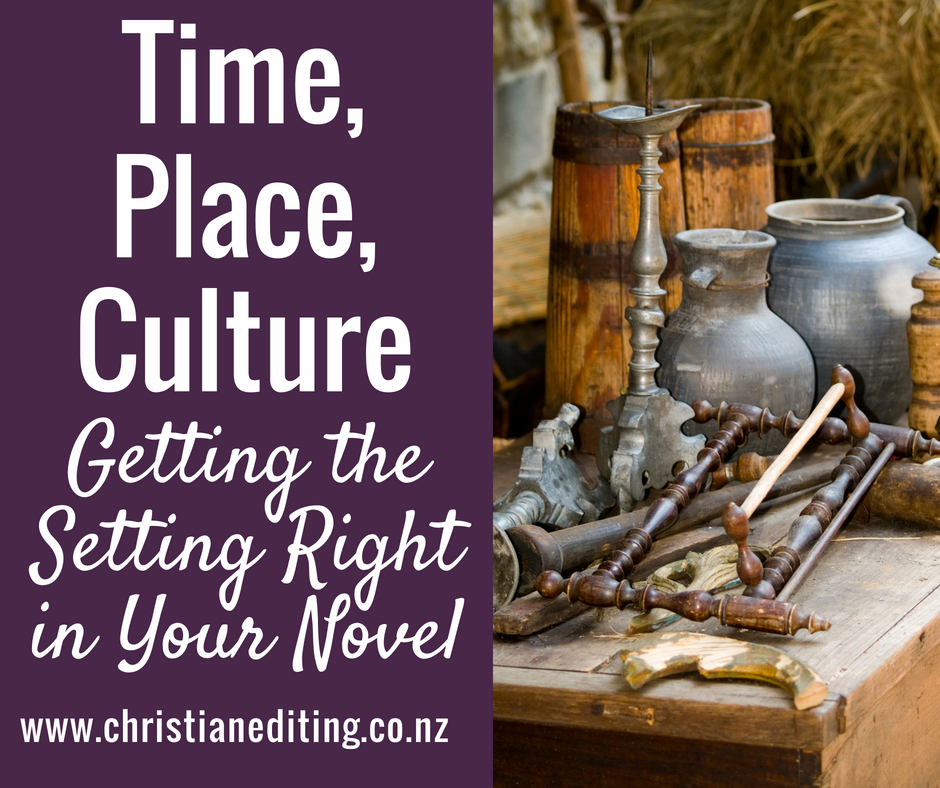This is another blog post based on a comment in a Facebook group (I seem to be getting into a habit, don’t I?). This was a conversation about editing.
One author commented that there are several changes she’d like to make to her debut novel, a historical romance published in 2017. Apparently, her research for her next novel has highlighted some inaccuracies in that first novel.
It should come as no surprise for you to know I’ve read the novel in question. It probably also won’t come as any great surprise to know that I found several inaccuracies in the setting.
The overall editing and proofreading in this novel was as good as I expect from a major Christian publisher.
The problem was with an element of editing that falls somewhere between developmental and line editing (both of which I addressed in a recent post).
Editing for Fact
Authors often make unintentional factual errors. I’ve found these fall into three main categories:
Time:
Using anachronisms, words which are too modern for the time setting of the novel.
Place:
Getting physical or geographical details wrong.
Culture:
Getting cultural details wrong e.g. a British character using an American English term in a time setting where s/he would have been unlikely to have known the American term (or vice versa).
Here are a few examples:
Danish (as a breakfast food):
Danish pastries were developed in Denmark in the 1850s. They spread to the United States during World War One, but it’s not clear when they were first introduced to England. My experience is that while the modern commuter might eat a Danish pastry for breakfast (or a pain au chocolate), breakfast at home in the 1880’s was more likely to be some form of cooked protein (bacon, eggs, kippers).
Entree (as part of a meal):
The entree is the main meal in modern USA, but the entree is the a small dish served before the main meal in England (and other Commonwealth countries). It took me a while to work out why the characters kept eating entrees, but never got to the main meal.
Marketing:
In Victorian England, marketing was the daily activity of going to the market to buy fresh produce to eat, not an activity undertaken by companies to sell products.
Schelp:
Schelp is an American English word derived from Middle High German via Yiddish. It dates from the early twentieth century, so an English woman in the 1880’s is unlikely to use the word.
Yard:
A unit of measure in British English, not a term used to refer to part of a property (the English have gardens, not yards).
These aren’t major mistakes.
None of them affected the believability of the plot (although I have read books where the factual errors did ruin the plot for me).
Also, using the correct English term (e.g. entree) may confuse American readers where the term has a different meaning in the USA. It is a balancing act.
But mistakes such as marketing and schlep brought me out of Victorian England and took me to twenty-first century America. And anything that draws the reader out of the story is a bad thing. We read to be drawn into the fictive dream, not thrown out of it.
This was brought home again by the story I was reading this evening, set in England in 1940. It’s a setting many of us know through such classics CS Lewis’s Narnia stories. So why did the English characters hide in a closet? We’ve all heard of The Lion, The Witch, and the Wardrobe. So why did the American author feel the need to change “wardrobe” to “closet”?
How can authors stop this happening?
The best way to stop these kinds of errors is to be an expert in the time and place you are writing about. But that’s not always possible—we can’t all dedicate years to studying a specific period in history. And readers don’t want endless contemporary women’s fiction offerings about the challenge of balancing home, work, and family, and still trying to find room for hobbies and faith in the modern world.
Readers want variety.
Which means writers have to write more than what they know.
Which means research.
The research is rarely the problem. Authors research, and find out so many fabulous details that the challenge becomes what to leave out, not what to put in.
The real problem comes when the author adds information they haven’t researched. It’s an old problem: we don’t know what we don’t know. So we use a word that’s wrong for the time setting or location without realising it.
How do we avoid errors in our setting?
We need to find people who have knowledge of the areas we’re not personally familiar with:
- Time
- Place
- Culture
With the novel that prompted this post, the answer would have been to find a beta reader or freelance editor who knows British English (perhaps someone who is English or has lived in England), and who knows something of the geography and history. I’ve read novels where the main character saw Oxford while traveling from London Heathrow to Bath. Nope. Not unless your driver is taking you for a ride, literally and figuratively.
Different novels will require beta readers or editors with different backgrounds and different knowledge. For example, an author writing about Native Americans or people of colour would benefit from finding an early reader with the appropriate racial or cultural background.
An author writing for a traditional publisher might think they don’t need to hire an editor or find beta readers with specialist knowledge. Won’t their publisher do that for them? First, obvious errors will affect your chances of gaining a publishing contract.
Even if you do get a contract, an increasing number of traditional publishers are outsourcing their editing. This means authors may or may not be assigned an editor with knowledge of the time, place, or culture of their novel. And many editors don’t undertake fact checking—research is the author’s job.
It’s your job as the author to get your facts right.



